Thanks for tuning into our guide to the best Wi-Fi Mesh systems right now. If you’re a keen gamer with a large home, you’re in the right place.
I’ve been finding out exactly what it takes for a Mesh Wi-Fi kit to be a great fit for gamers. And most importantly, we’ve been testing tons of systems here at Networks Hardware in order to bring you the best ones.
Overall, I found the best option is the ASUS ZenWiFi AX AX6600. That’s because it offers fantastic range, speed, and features, all for a pretty good price.
ASUS ZenWiFi AX (XT8) AX6600
Best Overall
- Tested max speed: 836.45 Mbps
- Standard number of satellites: 1, 2 or 3
- Range of each satellite: 100ft
- Recommended for: plans up to 1200 Mbps
- Warranty: Two years
But there are plenty of other great options for those in slightly different personal situations.
Stay tuned to find out what those are, and find out how we came to those decisions.
Top 5 Wi-Fi Gaming Mesh Systems
Here are what we think are the best Wi-Fi Mesh systems for gaming:
- Best overall: ASUS ZenWiFi AX AX6600
- Best for speed: Netgear Orbi RBK852
- Best for budget: TP-Link Deco S4
- Best for security: ASUS ZenWiFi AX Mini XD4
- Best for the largest homes: TP-Link Deco AX60
Best Wi-Fi Mesh Systems for Gaming Explained
Here’s a look at the most important information on each of these devices.
#1 Best Overall: ASUS ZenWiFi AX AX6600
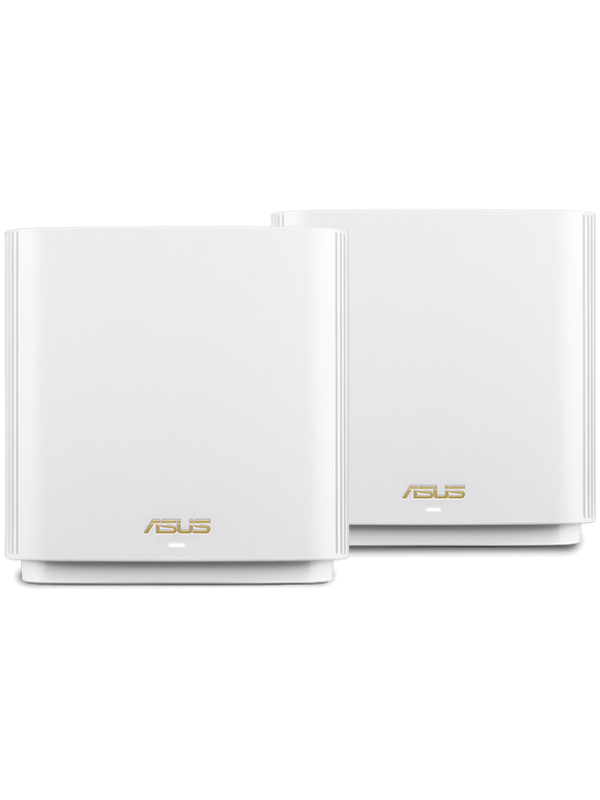
- Tested max speed: 836.45 Mbps
- Recommended for: Plans up to 1200 Mbps
- Satellite range: 100 ft
- Wireless standard: Wi-Fi 6
- Warranty: Two years
Pros
- Immense speed for the price
- Wide range on each satellite
- Good parental controls & QoS
- Tri-band means better connections and bandwidth
Cons
- The 2.4 GHz band is a little slow
The ASUS ZenWiFi AX AX6600 is just about the best in the business for value for money right now in my eyes. It’s definitely not ‘cheap’, but it packs a lot of punch in many ways: great speed, tons of features and strong connections.
Let’s start with the former. We tested the speed of the router from 5 ft away on a Wi-Fi 6 device and managed to clock in some 836.45 Mbps. That’s a huge amount of speed over Wi-Fi!
We found that anything around the 800 Mbps mark would be more than enough for a large family or even a medium-sized office. After all, it could handle a huge 32 simultaneous Ultra HD streams. Many gamers could enjoy high quality sessions at this kind of speed.
This speed was measured using one of the two 5 GHz bands. The 2.4 GHz band isn’t quite as quick with a top speed of 184.02 Mbps in our test. But that’s still not too bad compared to some of the competition.
I found the range to be around 100ft for each satellite node which is really impressive. You won’t need to buy a whole lot of kit in order to play games in the far corners of a large home.
And speaking of the existence of 2 5 GHz bands, one of them doubles up as a ‘backhaul’ band meaning the connection between the satellites is strengthened, improving the overall Mesh network.
Furthermore, there are some great features. AiProtection Pro contains top tier security and parental controls so that you can keep your network safe as well as any youngsters who you may be sharing it with.
There’s also Adaptive QoS which allows players to assign profiles to devices in order to get better performance on some compared to others. The QoS even has a specific gaming mode that you activate to lower latency and improve speed for your next session.
Finally, the AX AX6600 has recently added WPA3 encryption. This means your sensitive data will be protected by the latest and greatest in online encryption technology.
All-in-all, this is a brilliant all-rounder Mesh system and will certainly bring your gaming experience for life.
#2 Best For Speed: Netgear Orbi RBK852
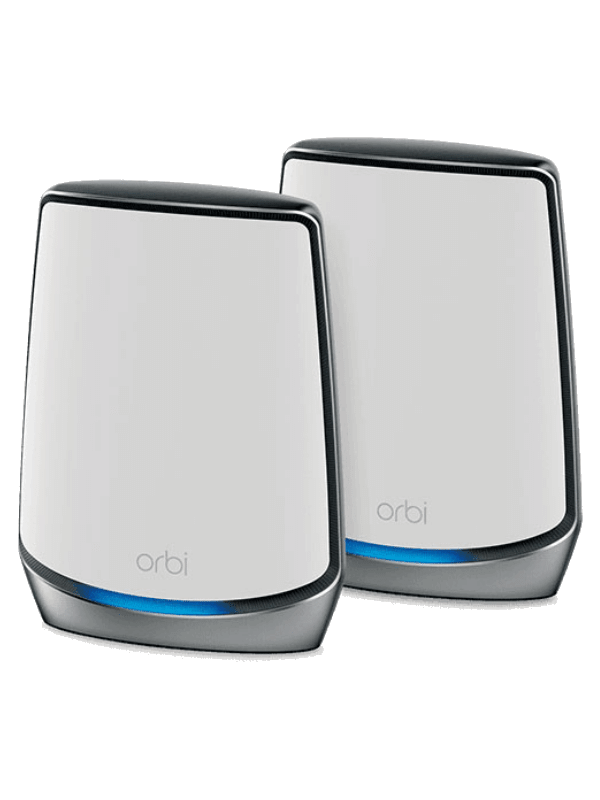
- Tested max speed: 851.86 Mbps
- Recommended for: Plans up to 1200 Mbps
- Satellite range: 125 ft
- Wireless standard: Wi-Fi 6
- Warranty: One year
Pros
- Some of the fastest Mesh speeds out there
- Immense satellite range
- Good connection between devices thanks to backhaul band
- Beautiful hardware
Cons
- Only one year of warranty
- Very expensive compared to the competition
The Netgear Orbi RBK852 satellites look amazing and perform pretty amazingly as well. They managed to score a speed of 851.86 Mbps in our 5 ft test. Impressive. But only around 15 Mbps faster than our top pick.
That kind of speed is about as good as it gets for a Wi-Fi 6 Mesh system. It should support multiple gamers using the connection at the same time. However, it’s only worth going for if you have an internet plan that’s fast enough to support it.
It’s also quicker than the ZenWifi AX AX6600 on the 2.4 GHz band. We managed to get a speed of 291.73 Mbps from this band which is over 100 Mbps faster than the AX6600.
That’s useful information for those with really older devices (like an iPhone 5). But more importantly, the 2.4 GHz has a wider range than the 5 GHz one.
Speaking of range, the RBK852 performs pretty well with both bands. I found that the range of each satellite is 125 ft which is quite a bit higher than the AX6600 also.
In terms of features, the RBK852 does pretty well too. Customers will get Netgear Armor antivirus technology for free. It’s one of the best antivirus tools out there and will work hard to keep your computer or games console free from threats.
A side note: the RBK852 is code for the two-pack of satellites. If you have a larger home, you could be better off with the RBK853 (the three-pack) or the RBK854 (the four-pack). Of course, things are going to start to get pretty expensive at this point.
And the main issue here is indeed the price. The RBK852 is rather expensive indeed, and you only get one year of warranty. This means that if you have any issues after the one year mark, you won’t be able to get it covered by Netgear.
By the way, we actually slightly prefer the RBK852’s younger sibling, the RBK752, in terms of overall value for money. It clocked a top speed of 805.61 Mbps in our test, only 46 Mbps less than the RBK852. And it’s quite a lot cheaper.
Either way, the Orbi devices are awesome Mesh systems for gaming if your internet plan is fast enough to justify purchasing them. Just make sure you budget accordingly.
#3 Best For Budget: TP-Link Deco S4
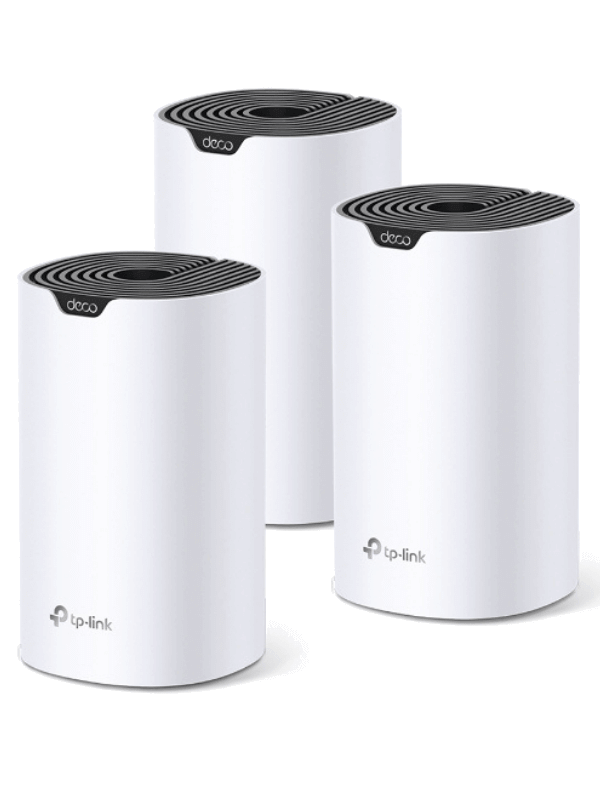
- Tested max speed: 317.27 Mbps
- Recommended for: Plans up to 500 Mbps
- Satellite range: 100ft
- Wireless standard: Wi-Fi 5
- Warranty: Two years
Pros
- Very affordable
- Wide satellite range
- Connects to a lot of devices
- Reasonable features for the price
Cons
- Wi-Fi 5 means lower speeds on both bands
- Slow 2.4 GHz may compromise the range
If you’re looking to save some money on your Wi-Fi Mesh gaming system, consider the TP-Link Deco S4. But only if you’re not planning on sharing the network with a lot of people. This piece of kit is far less expensive than our other picks but still delivers in a few key areas.
This is a Wi-Fi 5 router as opposed to a Wi-Fi 6 one. This is an older technology that cannot deliver as good speeds as Wi-Fi 6. But it is, of course, more affordable.
The top speed we managed to get from it in our test was 317.27 Mbps. This is obviously quite a lot slower than our top two. However, it should be enough to handle a handful of simultaneous gaming sessions.
The top speed we managed on the 2.4 GHz band, however, is only 44.7 Mbps. Considering that this is only a dual-band system (there is no second 5 GHz band like our top two), it could compromise the connection between satellites.
If you’re looking to build a large Mesh network with many satellites, the Deco S4 probably won’t be the best option for you.
The range of the Deco S4 is very impressive considering the price. Each satellite looks to offer around 100 ft of coverage, the same as our top pick overall.
However, TP-Link recommends that you keep the satellites within 50 ft of one another in order to get the fastest speeds further away from the original router.
In terms of security, the Deco S4 is okay. It doesn’t have WPA3 encryption, but that’s to be expected for the price. WPA2 is available and so too is some decent free antivirus technology from TP-Link.
Parental controls and QoS for this Mesh system are controlled through the TP-Link Deco app. They’re not quite as good as some of the competitors but they still do the job required and then some.
By the way, I’d like to make an honorable mention at this point to the TP-Link Deco X20. It’s one of the most affordable Wi-Fi 6 Mesh systems out there but it still delivers, so I recommend considering that as well!
Anyhow, the TP-Link Deco S4 is our top pick for budget gaming Mesh systems today. It’s super cheap, pretty quick and has some great features all for a fantastic price. There are cheaper Mesh systems out there, but this one is the best for gamers on a budget.
#4 Best For Security: ASUS ZenWiFi AX Mini XD4
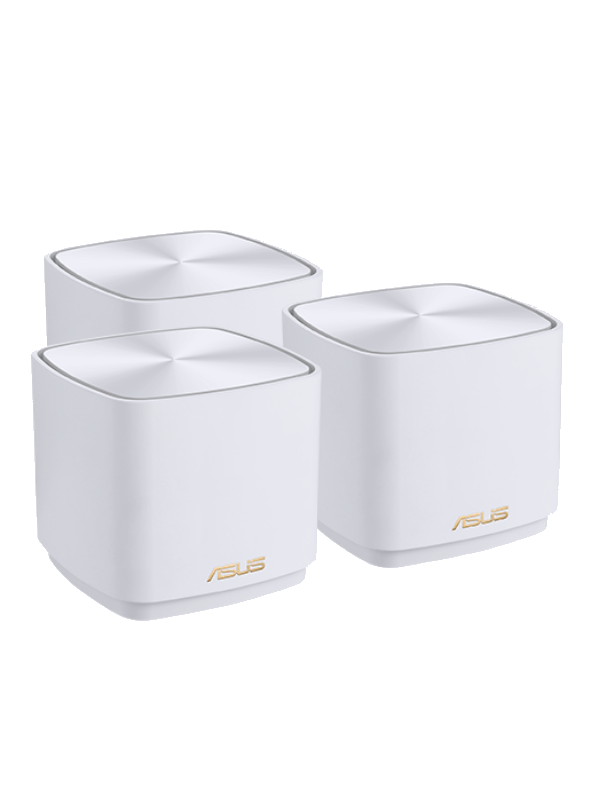
- Tested max speed: 721. 6 Mbps
- Recommended for: Plans up to 800 Mbps
- Satellite range: 70ft
- Wireless standard: Wi-Fi 6
- Warranty: Two years
Pros
- Very quick for a ‘mid range’ kit
- Solid features
- Excellent security
- Attractive hardware design
Cons
- The satellite range is a bit limited
- Still a little pricey
The ASUS ZenWiFi AX Mini XD4 is the little brother of our top pick overall, the AX6600. But it doesn’t compromise too much on performance or features. It costs a bit less, but not much.
The top speed we managed to get from this router in the same test was 721.67 Mbps. That’s still very quick, and will be enough for many gamers to play at the same time.
The range is one thing worth considering though. Each satellite will only connect around 70 ft from another, and that’s not factoring in walls, furniture etc. So while you might save a bit on price, you may also need to buy more satellites if you live in a really large home.
On the plus side, you’ll get Trend Micro security with the XD4 which is a really useful tool for keeping your home network safe. This is a particularly useful option for gamers who will, of course, come into contact with a lot of random people online.
The parental controls aren’t quite as good as the more expensive AX6600 on this model. But they still function pretty well. And, the XD4 comes with Adaptive QoS, meaning you can get up a gaming profile on your console, allowing for lower latency and faster speeds.
So, if you have a slightly slower internet plan and a relatively large home (but not too large!), the XD4 is well worth considering for us.
#5 Best For the Largest Homes: TP-Link Deco AX60
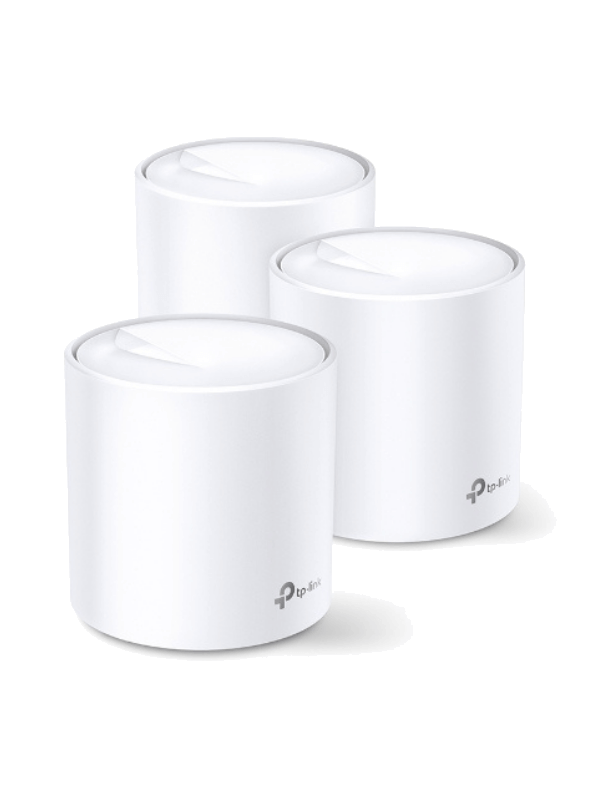
- Tested max speed: 821.81 Mbps
- Recommended for: Plans up to 1000 Mbps
- Satellite range: 100 ft
- Wireless standard: Wi-Fi 6
- Warranty: Two years
Pros
- Good range on each satellite
- Relatively inexpensive for the performance
- Great app for features and setup
Cons
- Slow for Wi-Fi 5 devices
TP-Link are one of the best Mesh creators out there and one of their flagship models is the Deco AX60. If you’re looking to save a little money but still provide a strong network to a large home, this is a good option.
Each satellite has a great range at around 100 ft. This means you can spread your network over a really large area.
It’ll be quick, too. We managed to clock in a top speed of 821.81 Mbps with a Wi-Fi 6 device. That puts it up there with much more expensive models. That’s a lot of simultaneous gaming activity waiting to happen!
However, the performance is not so good for WiFi 5 devices. We only managed to get 214.25 Mbps, which is slower than all of our other top Mesh systems.
That may be an issue if you have a previous generation games console such as a PS4, which does not support Wi-Fi 6. All major games consoles from the latest generation (such as the PS5 and the Xbox One) support Wi-Fi 6 though.
For a reasonably priced Mesh kit, the features on the AX60 are pretty good. It comes with reasonable QoS and parental controls. This means you can get the best out of your gaming sessions while keeping any children using the network safe.
So, our number five is still a very strong option indeed. It will be a great fit for those with larger homes and internet plans of up to 1000 Mbps.
Wi-Fi Gaming Mesh Buying Guide
There are a few key things to consider as you choose your Wi-Fi Mesh system. Here’s our guide to selecting the right option for you gamers.
And if you want to know more about buying routers in general, you can check out our ultimate router buying guide.
Do You Really Need Mesh?
If you’re a gamer in a large home, Mesh could be a great idea. We typically recommend it for those in a home of 3000 sq ft in size or more.
But what exactly is it? Mesh is a form of Wi-Fi extension technology that does not require you to connect to a new network when you move from the connection of one satellite to another.
This means you can move around the home and stay connected seamlessly. A great option for portable games consoles for a start.
If you’re unsure as to whether Mesh is the right option for you (or if you could save money by opting for a more conventional Wi-Fi extender), check out this comparison guide.
Wi-Fi 5 vs. Wi-Fi 6 Speed
Wi-Fi 6 is a faster option but routers that support it are more expensive. Wi-Fi 5 will be fast enough for most gamers. Plus, Wi-Fi 6 is only worth it if you have an internet plan that’s fast enough to justify it. That could be anything over 500 Mbps.
That being said, if you’re sharing the network with a lot of heavy internet users, you may still be better off with Wi-Fi 6. It’s a better option for communication with many devices.
Previous generations of games consoles (such as the PS4) only support Wi-Fi 5. That doesn’t mean you won’t be able to use them with a Wi-Fi 6 router, just that you’ll get slower speeds.
There is a further option: Wi-Fi 6e. This is even faster still thanks to a third band of 6 GHz, but it does have a shorter range than the 5 GHz ones discussed above. No major games consoles support this yet though.
Right now, Wi-Fi 6e Mesh systems are highly expensive and probably not worth it. Nonetheless, you can find out more about the technology here.
To learn more, read our article on Wi-Fi 5 vs. Wi-Fi 6.
Additional Wi-Fi 6 Technologies
Wi-Fi 6 comes with a few additional technologies that could improve your online gaming experience: beamforming, MU-MIMO and OFDMA.
Beamforming will be a neat tool for gamers as it allows you to direct your wireless signal to specific devices. This has the effect of improved performance and faster connections.
MU-MIMO and OFDMA work together to improve the performance of multiple devices connected simultaneously. So if you have a lot of internet devices or live with a lot of people who will be sharing the network, I recommend considering Wi-Fi 6 for this.
Dual-Band vs. Tri-Band
If you’re looking to game with multiple people, or far away from the original router, tri-band could be the way forward.
Adding a third band (usually a 5 GHz one, or 6 GHz band in the case of Wi-Fi 6e) will free up bandwidth allowing for improved speeds when many devices are connected.
Tri-band routers sometimes go a step further with Mesh as the third band can double up as a ‘backhaul’ band. This improves the connection between the satellites, allowing for faster speeds further away from the original router.
For more info, read our article on dual-band vs. tri-band routers.
Extra Features and Apps
A couple of other tools to consider are QoS and parental controls.
QoS allows you to direct more network attention to specific devices by throttling the bandwidth for other connected devices. This improves speed and lowers latency and will be particularly useful for gaming where low latency and fast speeds are key.
Parental controls aren’t directly useful for gaming but if you have any young children on the network, they’re advisable. The tool allows you to restrict access to certain types of content for specific users.
However, if your parental controls allow you to set time limits, then this could be a good tool for if your children are gaming too much!
Another cool feature a lot of Mesh systems come with is smart home compatibility. If your Mesh system can hook up with your smart devices, it can make life a lot easier!
Wi-Fi Security
Gamers need to focus on their online security just as much as the next person. If not more! I recommend finding a Mesh kit with some kind of antivirus technology. This will keep your network free from outside threats.
It’s also worth considering encryption. WPA3 is the top tier of encryption and will stop your sensitive data from being compromised. However, WPA2 encryption, the previous standard, is still pretty good.
On top of actual security software, it’s worth considering the warranty of your Mesh kit. This protects you if there are any faults, and it’s good for peace of mind to have two years or more instead of the minimum in the US of one.
Mesh For Wi-Fi Gaming FAQ
Here are the most frequently asked questions about Wi-Fi Mesh for gaming and the answers to them.
Have there been any announcements for Wi-Fi 7 Mesh?
At the time of writing, there’s been no set date for the release of Wi-Fi 7. However, it’s well into its development phase, and is rumored to be released some time in 2024.
How many Mesh satellites do I need in my home?
It’s worth doing the math to find out the answer to this question. Buying too many will be a waste of money whereas not buying enough will leave some dead zones in your home.
To do this, calculate the size of your home and then look at the range for each satellite of your Mesh system.
Do I need a router if I’m going to use Mesh?
The Mesh systems we’ve discussed today are routers only, not modems as well. If you have cable internet, you’re going to need to pick up a modem to get online. You can check out some of the best ones here.
However, a lot of internet users are on fiber these days. If that’s you, you won’t need to add an additional modem as well.
Last Thoughts on Wi-Fi Mesh For Gaming
Mesh is a fantastic option for gamers who live in large homes. If that’s you, you’ve got a lot of choices out there.
I found that the best Mesh system for gaming overall was the ASUS AX AX6600.
It covers all bases and does so for a pretty good price. But you can get faster or cheaper systems, so if you have other preferences, one of our other top picks may be a better option.
Either way, with our recommendations and buying guide in mind, you’ll be in prime position to make the right choice. Enjoy!
